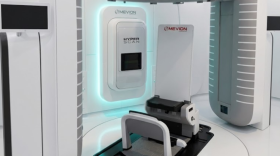By many metrics, the COVID-19 pandemic is behind us.
Governments around the world lifted emergency declarations and even health care facilities removed mask requirements. But the SARS-CoV-2 virus — which causes COVID-19 — is still circulating, and growing evidence suggests that multiple exposures to the virus, even when initial infections are mild, increases the likelihood of developing long COVID symptoms.
Dr. John Baratta leads the UNC Health COVID Recovery Clinic, a wing of the health system's rehabilitation care dedicated to patients with long COVID symptoms. Even vaccinated patients with mild initial symptoms can develop long-lasting symptoms later, according to Baratta.
"We do as a society now have a good amount of built-up immunity," Baratta said. "But yes, unfortunately we do see some people who come into our clinic who develop long COVID on their second or third COVID illness."
Long COVID symptoms are familiar to Chastity Kinsey, a resident of Enfield, North Carolina, who learned firsthand how these long-term symptoms can affect a person. Kinsey, 46, caught COVID-19 in the fall of 2022, just one week before she was scheduled to get a booster vaccination shot. She had relatively severe symptoms and would crash at the end of the day.
"And when I say crash, I would crash," she said, emphasizing the second "crash."
Kinsey recovered from the initial infection, but some of her symptoms persisted, particularly fatigue and brain fog. She’s been an educator for nearly a quarter century and is now the principal of Everetts Elementary School in Roanoke Rapids. One of the most frustrating aspects about the experience was that even her doctors in Halifax County treated her long COVID symptoms with skepticism.
"When you have Long COVID, a lot of times people don't believe what's going on," she said. "And that's really unfortunate. It's almost like you are in a world by yourself."
But Kinsey's story didn't end there. She found the long COVID clinic at UNC Health Care and booked an appointment. That clinic specializes in helping patients rehab through their long COVID symptoms. Allison Judge, the clinic nurse coordinator, said Kinsey's story is not unique.


"One of the things that really is disturbing is that a lot of our patients, when they come in, they are angry, they are frustrated," Judge said. "They feel rejected and overlooked. And it's really unfortunate that that is still going on."
Judge said she spends a lot of time advocating for her patients, something she wishes more primary care physicians would do.
"I think what's different here is that we're not going to say to them, 'Hey it's in your head.’ Because it's not in your head. It's real," Judge said. "And the trauma from long COVID is very real. I don't really hear that even being talked about. So here we embrace them. We surround them. And it's a very, very supportive environment. Very different than what they've been experiencing out there in the real world."
The UNC COVID Recovery Clinic includes a gym where patients can work on various exercises to build up endurance. It also features cognitive exercises for patients, including a driving simulator that Baratta, the clinic’s director, took for a spin on a recent morning.
"This allows our therapists to assess a patient's safety with driving, including how well they pay attention to obstacles in the road, road signs, speed limits," Baratta said.
The clinic has been open for two and a half years and has seen more than 2,000 patients from 85 counties and 15 states. Of particular concern to Baratta is that he's noticed an increased risk of long COVID in patients who catch the virus multiple times, even if their initial symptoms weren't bad.
"There does seem to be an accumulating risk for those with multiple COVID infections," Baratta said.
Baratta adds that severity of the initial infection doesn't seem to impact the likelihood of developing long COVID. Some of his patients had very mild initial symptoms but deal with fatigue or brain fog for months.
Kate Cardoza, a clinic social worker, said she hopes increased understanding of these symptoms will lead to better support for patients.
"They worry that they're not able to play with their kids like they used to, or be there for their spouse in the same way that they would like to,” Cardoza said. “And that's really hard on them. They have a lot of feelings of guilt at times about that."
New research has identified a possible genetic marker that could give clues as to why some people develop long COVID symptoms, while many do not. But that research is still in its early stages.















